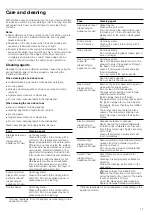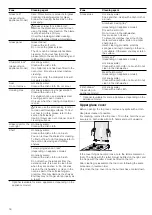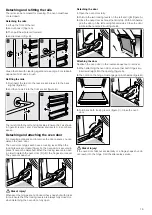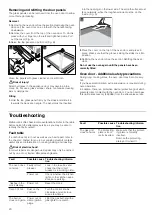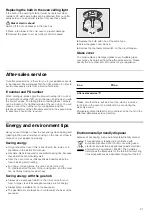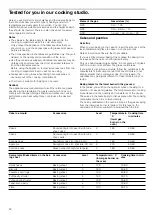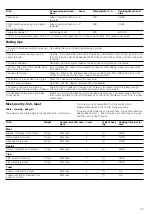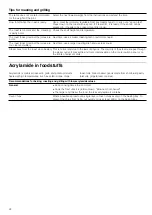
24
Tips for roasting and grilling
Acrylamide in foodstuffs
Acrylamide is mainly produced in grain and potato products
heated at high temperatures, such as potato crisps, chips,
toast, rolls, bread, baked goods made from shortcrust pastry
(biscuits, gingerbread, cookies).
The table does not contain information
for the weight of the joint.
Select the next lowest weight from the instructions and extend the time.
How to tell when the roast is ready.
Use a meat thermometer (available from specialist shops) or carry out a “spoon test”.
Press down on the roast with a spoon. If it feels firm, it is ready. If the spoon can be
pressed in, it needs to be cooked for a little longer.
The roast is too dark and the crackling
is partly burnt.
Check the shelf height and temperature.
The roast looks good but the juices are
burnt.
Next time, use a smaller roasting dish or add more liquid.
The roast looks good but the juices are
too clear and watery.
Next time, use a larger roasting dish and use less liquid.
Steam rises from the roast when basted. This is normal and due to the laws of physics. The majority of the steam escapes through
the steam outlet. It may settle and form condensation on the cooler switch panel or on
the fronts of adjacent units.
Recommendations for baking, roasting and grilling with low acrylamide values
General
■
Keep cooking times to a minimum.
■
Cook the food until it is golden brown. "Browned, not charred".
■
The larger and thicker the food, the less acrylamide it contains.
Oven chips
Where possible, spread out a single layer of oven chips evenly on the baking tray. To
prevent the chips from trying out quickly, cook at least 400 g on the baking tray.
Summary of Contents for HGA24W255I
Page 1: ... en Instruction manual Free standing cooker HGA24W255I HGA24W255M ...
Page 2: ......
Page 25: ......
Page 26: ......
Page 27: ......








